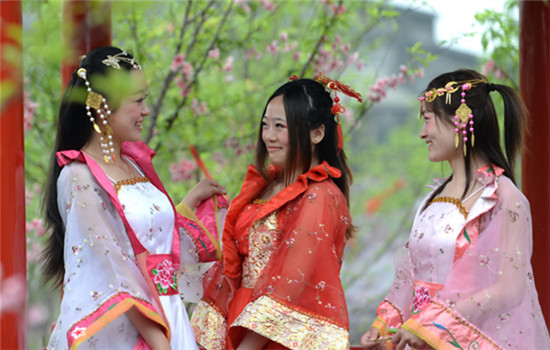Let’s all go green and explore its real economic benefits

Girls in traditional Chinese costumes enjoy a spring tour in Fantawild park in Wuhu, Anhui province. (Lai Xinlin / For China Daily)
Prose writer Liu Liangcheng wrote his book In Xinjiang with a tribute to the ancient town of Kuqa, claiming that “in this field, grass can grow old heartily without worries of being eradicated. A tree does not need to worry about choosing a wrong place for growth … Birds nest in the branches and catch insects in the wheat fields underneath.”
But, he laments, “in many places, people have been too diligent, changing the Earth to an unearthly state that only suits themselves for a living … There, except for the edible grain, the land no longer has any right to grow anything else.”
Much so in an era of industrialization and urbanization, so I tried to find an example which goes against this trend, and got one: Wuhu, a city in Anhui province sitting on both banks of the Yangtze River.
This past spring, I toured its God Mountain Park. Strolling around, I could hear birds chirping, see many people walking, playing or doing exercises, and encounter lakes dotted with lotuses and reeds, five mountain ridges flanked by trees, flowers and weeds, as well as small rivers abuzz with fish and insects.
I told the city’s information office chief Ma Tao, who accompanied me on the trip, that the city must have forgone a lot in preserving this 326-hectare parkland, as the area might have been packed with many cash-earning high-rises, as Wuhu is renowned for its Chery cars, Conch cement, Fantawild travel and booming industrial and high-tech zones.
He nodded, adding: “But you can see so many people enjoying themselves here. On weekends, there are more. Their enjoyment and ensuing improved health are our gains. We all know that for everything forgone, there’s a gain.”
So that’s their gain. By forgoing a trade-off of possible high-rises, they gained pleasure and better health.
Years ago, when I read Thomas Sowell’s A Citizen’s Guide to Economics, I was deeply impressed by its quotation from Ann Landers: “You can’t have it all. Where would you put it?”
Wuhu gave us an answer. And so do numerous other places. Nanjing’s Translations magazine reported recently that in the German city of Hanover, local residents have fought for more than 600 years to protect the Waldstation Eilenriede, a 600-hectare sea of forests from occupiers, logging thieves, builders, designers and even the city government. They eventually saved this forest sanctuary for them to seek enjoyment and peace.
The Christian Science Monitor reported the U.S. Fish and Wildlife Service on Oct 25 completed the establishment of the Great Thicket National Wildlife Refuge, including 15,000 acres of land mainly consisting of shrubland teeming with animals and insects. It will be the country’s 566th, joining a network of protected areas covering over 150 million acres of land.
But, are there real gains behind green economics?
Wuhu information office chief Ma pointed out residents’ enjoyment and their ensuing improved health, which I believe might lead to reduced medical bills.
The U.S. group Defenders of Wildlife said that the major benefit of the Great Thicket National Wildlife Refuge would be that it would attract birdwatchers and other visitors.
The U.S. Fish and Wildlife Service cited a 2013 national report, saying that spending by visitors to the refuge generated nearly $343 million in local, county, state, and federal tax revenue in 2011, while supporting more than 35,000 jobs.
In Guangdong province, seven villages at the foot of Luofu Mountain have transformed themselves into a “sea” of flowers-instead of planting crops-since 2015, attracting urban dwellers to take weekend tours there.
Nanfang Daily reported that the villagers’ gains are obvious. During the May Day holiday this year, they attracted around 80,000 visitors, netting 5.6 million yuan ($836,000) from fruit and vegetable sales, and catering.
So that’s real. Let’s all go green, and fully explore what it can bring.
By MA CHENGUANG
